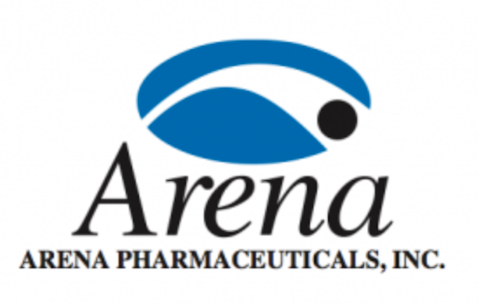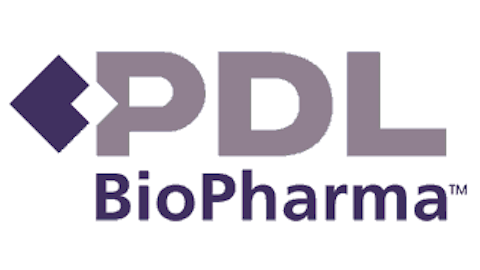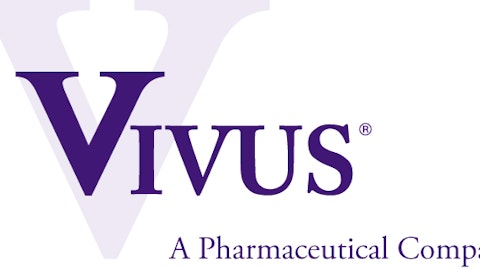Despite announcing a probable entry into Mexico of Belviq (lorcaserin), shares of Arena Pharmaceuticals, Inc. (NASDAQ:ARNA) went down 2.31% in trading in a single day recently. Year-to-date, the stock has gone down more than 9%, and 23.25% from this year’s high achieved in mid-January 2013.
We have been forever waiting for the regulatory processes to get over with so they can launch the first drug in their portfolio. It seems like we will have to wait awhile longer now. So while we wait, lets sit down and wonder whether today’s dip should be used to buy into the stock, or is it a signal for those already invested to exit.

So whats going on at Arena Pharmaceuticals, Inc. (NASDAQ:ARNA)?
Right now, and as everyone knows, Arena Pharmaceuticals, Inc. (NASDAQ:ARNA) is a single drug company with one FDA approved anti-obesity drug, Belviq. The company, however, has four candidates, one each for pulmonary arterial hypertension, thrombotic diseases, autoimmune diseases and pain, in pre-clinical and phase 1 development phases.
Arena Pharmaceuticals, Inc. (NASDAQ:ARNA) is yet to report profits. Total revenue for the year ended December 2012 was $27.589 million, a quantum jump from $12.7 million reported for the FY 2011. The increase in revenue was mainly due to milestone payments of $20 million from Eisai. Net loss for the year was $88.30 million mostly due to high research and development expenses. However, it was approximately $23 million lower than the prior year.
Checkered history of lorcaserin
There were problems with lorcaserin when it was submitted for FDA approval in 2010 on issues of side effects and carcinogenicity. However, these fears were allayed in later trials and the second time around the FDA approved the obesity drug in June 2012. Near about that time another obesity drug, Qsymia of VIVUS, Inc. (NASDAQ:VVUS), was also approved.
Belviq launch
Belviq was to be launched in the U.S. early last year after the DEA completed its scheduling. However, the DEA proposed to place the drug in Schedule IV of the Controlled Substances Act. The DEA schedules drug in 5 categories with Schedule I being the least and Schedule V the most restrictive. In this matter, the DEA has agreed with the FDA and Schedule IV is considered to be a positive for Belviq.
People having objections to this were to file their comments by January 18, 2013. After a mandatory period for comments and response (75 days plus another 30-day hold) Eisai, Arena Pharmaceuticals, Inc. (NASDAQ:ARNA)’s marketing partner, can start selling Belviq.
So why was Arena’s stock going down?
The problem is not with the delay that the DEA is causing. It is a process that has to be gone through and there is no way that it can be cut short. The earliest that Belviq could hit the shelves was March 3, 2013 only if the DEA waived the 30-day hold period, which was well within its power. That has obviously not happened. The fact that news of DEA’s scheduling of Belviq is not being widely reported does not make matters any better for Arena.
There is also the problem of approval from Europe’s regulatory body, European Medicines Agency (EMA), which is known for its strict adherence to safety protocols. The EMA and its advisory committee are looking into side effects of lorcaserin identified during the previous and present studies. This is despite the fact that FDA considers Belviq safe and did not insist on Risk Evaluation and Mitigation Strategies (REMS). Delay by EMA was expected as it usually does not follow FDA’s footsteps but it is the inordinate delay in approval that is causing the problem.
Competition
Belviq was approved about the same time as Qsymia of VIVUS, Inc. (NASDAQ:VVUS) but not with REMS. Qsymia also had insurance concerns, which have not been fully resolved until now. Like Belviq, Qsymia has also not been approved by EMA as yet. On March 4, 2013, Vivus announced that it was lowering the price of Qsymia by 70%, causing shares of VIVUS, Inc. (NASDAQ:VVUS) stock to slide. The market viewed this as a threat to Belviq and shares of Arena also reacted to the news and slid 4.4%.
The Mexico application
Yesterday, Arena announced that Eisai, through its subsidiary Eisai Laboratories, has submitted a marketing authorization application for Belviq in Mexico with the country’s regulatory body, the Federal Commission for the Protection against Sanitary Risk. Based on this submission, Arena will receive a milestone payment of $500,000 from Eisai.
Mexico is viewed as a good market for an approved anti-obesity drug. It is believed that 30% of the Mexican population is obese and 70% either overweight or obese. However, a proposed entry in a potentially lucrative market and Arena’s cashbox sweetened with $500,000 still has failed to push the stock price up.
Short Interest
One probable reason for this could be too much short interest in Arena shares. 61 million shares, representing 28.41% of the total outstanding shares of Arena are in the red. Taking into account the average daily trading volume of Arena shares, it will take 11.64 days for covering the shorted shares.
So, is Arena a buy at this price?
Let us consider the technical side first. Although I am not a great admirer of short interest data, in this case it needs to be looked into. More than 10 days for covering mean that if a short squeeze were to begin, there is ample scope for an upward movement. However, it needs to be considered that in such cases the upward movement can be as short-lived as the downward move was when the stock was being shorted. That brings us to the fundamentals.
Investment in Arena is a long term play for those who believe that there is a huge market for FDA approved anti-obesity drugs. Belviq is among the two obesity drugs that were approved after a long wait of 14 years. Belviq is also considered to be safer than the other approved drug, Qsymia (like they say in Wikipedia, Dubious – Discuss).
It is just a matter of time before the DEA comes out with its scheduling, clearing the way for a commercial launch – the 30-day hold period should expire on April 3, 2013. Following DEA scheduling, apart from revenue from sales, Arena expects $65 million in milestone payments from Eisai, roughly $6 million from amortization of upfront payments from existing collaborations, $3 million from its manufacturing facility in Siegfried and another $1.5 million in additional regulatory milestone payments from Eisai.
My personal opinion is that Arena holds something for every type of investor short term as well as long term. Investors should use the current dip in stock price as an entry point. However, they need to approach the stock with great caution.
I have a fear that Belviq may not turn out to be as big a success as it is made out to be. Substantial appreciation is possible only after the company comes up with great numbers, failing which it may prove to be another long, long wait until the Arena can manage another FDA approval. Or an anticlimax.
The article Arena – Is The Recent Dip A Good Time To Buy? originally appeared on Fool.com and is written by Sujata Dutta.


